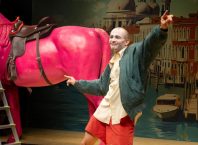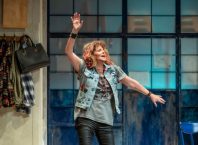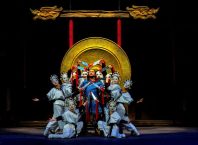Fear held me in its cold grip as I woke from a nightmare: the entire Gesher Theater was taken away to administrative detention. But it was only a dream, a night terror. That sort of thing would never happen here, in a democracy that honors freedom of speech, values and protects artistic freedom, and supports the cultural arts. Why would I even have such a nightmare anyway? All Gesher Theater has done is present an excellent production of Animal Farm, edgy, musical political satire with a sharp bite.
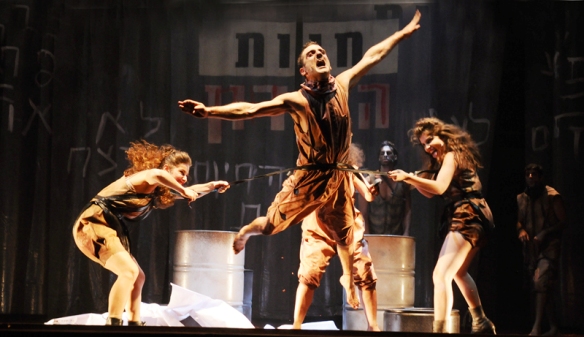
Directed by Noam Shmuel and performed by the Gesher Young Ensemble, all graduates of the Yoram Loewenstein Performing Arts Studio, an ensemble nurtured by Gesher Theater as it looks towards the future generation of performers. The production is based on Peter Hall’s outstanding musical stage adaptation of George Orwell’s novel Animal Farm, with music by Richard Peaslee and lyrics by Adrian Mitchell, translated with flow and great natural rhythm into Hebrew by Daniel Efrat. Published in 1945, Orwell’s tale, intended as a satire on the Russian Revolution, speaks more generally of the susceptibility of all revolutions to become a mode of ascent for power hungry leaders. As Orwell wrote (in a letter to Dwight MacDonald, published in George Orwell: A Life in Letters, Liveright): “You can’t have a revolution unless you make it for yourself; there is no such thing as a benevolent dictat[or]ship.”
There is an appealing simplicity to the base story, which employs allegory to convey its message. Orwell originally called it a “fairy tale,” a subtitle that is omitted from most editions, and this production has chosen very appropriately to introduce it as such. It’s easy to identify with the overworked, oppressed animals on Mr. Jones’ farm, a revolt against the drunken, lazy, violent farmer is inevitable. Noam Shmuel has created a production in which all the elements work together in such harmony, that one is utterly carried away by the sweeping emotions and rhythms of this fairy tale, experiencing the awakening exhilaration of revolt, the joys of community, and the growing sense of injustice and outrage.
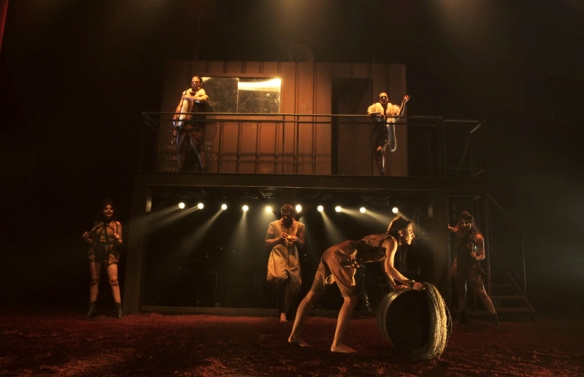
The simplicity of the story is echoed in the choice of costumes and set. Eschewing realism, the minimalist set designed by Niv Manor suggests a farm with something resembling straw strewn on the ground, a single wooden structure, barrels and ladders – simple elements that are combined in different ways throughout the play. As for the costumes, designed by Aviah Bash, an interesting choice was made to clothe the animals in identical tan colored jumpsuits, identifying and individuating the different animals through their make-up and accessories – here too, without pretense of naturalism. The horses held manes in their hands, the goat had a beard, chickens wore one red glove. Costuming the animals emphasizes their common bond as living creatures living under oppressive rule, as the play progresses, this similarity in appearance offers an ironic counterpoint to the rising rule of the pigs, culminating in their adoption of human clothes.
Yet from the play’s first moments, each animal is distinct as a member of its species, and as it progresses, each becomes distinct as an individual. The first is due to the imaginative and precise attention to movement in this production, choreographed by Amit Zamir. The movement is imbued with authenticity, humor and sensitivity – it is one of the many strengths of this production. The ensemble cast is wonderful, working well as a group and at the same time, each revealed to the audience as an individual with thoughts and feelings. Boxer (Gal Ben Amra) moves so eloquently, I am half convinced that he has horse DNA, and his unswerving loyalty and humble dedication invites one’s compassion. Snowball (Hillel Cappon) excites with his intelligent perception, while Napoleon (Aviv Carmi) with his down to earth pragmatism that devolves into near-demonic greed reminds me of all too many a familiar figure. Clover (Carmel Kandel) with her questioning mind and tender heart elicits one’s admiration throughout, while one cannot help but feel a pang as Molly (Sivan Mast) sings of the ribbons her new master will tie in her mane.
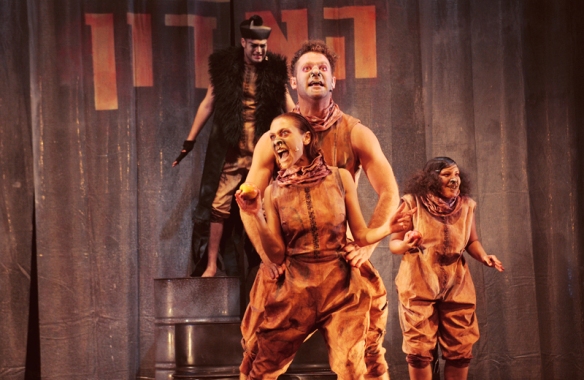
Live music accompanies this performance, with the accomplished musicians, under the direction of Nadav Rubinstein, cleverly half hidden most of the time on the floor of the barnyard structure. This production of Animal Farm simply breathes music, the songs and accompanying instrumentals are such an integral part of the work, working their associative magic on the mind. The songs work very well in Hebrew, moreover, the music for the production has been carefully selected for maximum subversive impact. As the animals experience their political awakening and join together to rebel against their oppressor and create a new, egalitarian, just society, one can recognize the melodies of popular Israeli folk songs in the instrumentals. These are songs that were written in the spirit of the new egalitarian, just society that would be built in the land of Israel, songs of hope and unity. Songs that for some, today, represent the false hope and false sense of unity intended to mask a culture in which there is an ever-widening abyss between the haves and the have-nots, in which, as Orwell put it “All animals are equal, but some animals are more equal than others.”
Animal Farm by George Orwell, adapted by Peter Hall, lyrics: Adrian Mitchell, music: Richard Peaslee.
Directed by Noam Shmuel; Translated by Daniel Efrat; Musical director: Nadav Rubinshtein; Vocal coach: Doki Atsmon; Set design: Niv Manor; Movement: Amit Zamir; Lighting design: Ziv Voloshin; Costume design: Aviah Bash; Assistant director: Hadas Sher; Stage manager: Tania Sochanov; Cast: The Gesher Young Ensemble – Avi Azulay, Tom Appelbaum, Yael Bouton/Yael Shildkraut, Imri Biton/Hillel Cappon, Shiri Ben Cohen, Gal Ben Amra, Eden Gozlan, Noa Har-Zion, Bar Gol, Dorel Zilberman, Sivan Mast, Aviv Carmi, Daniel Meroz, Carmel Kandel.


